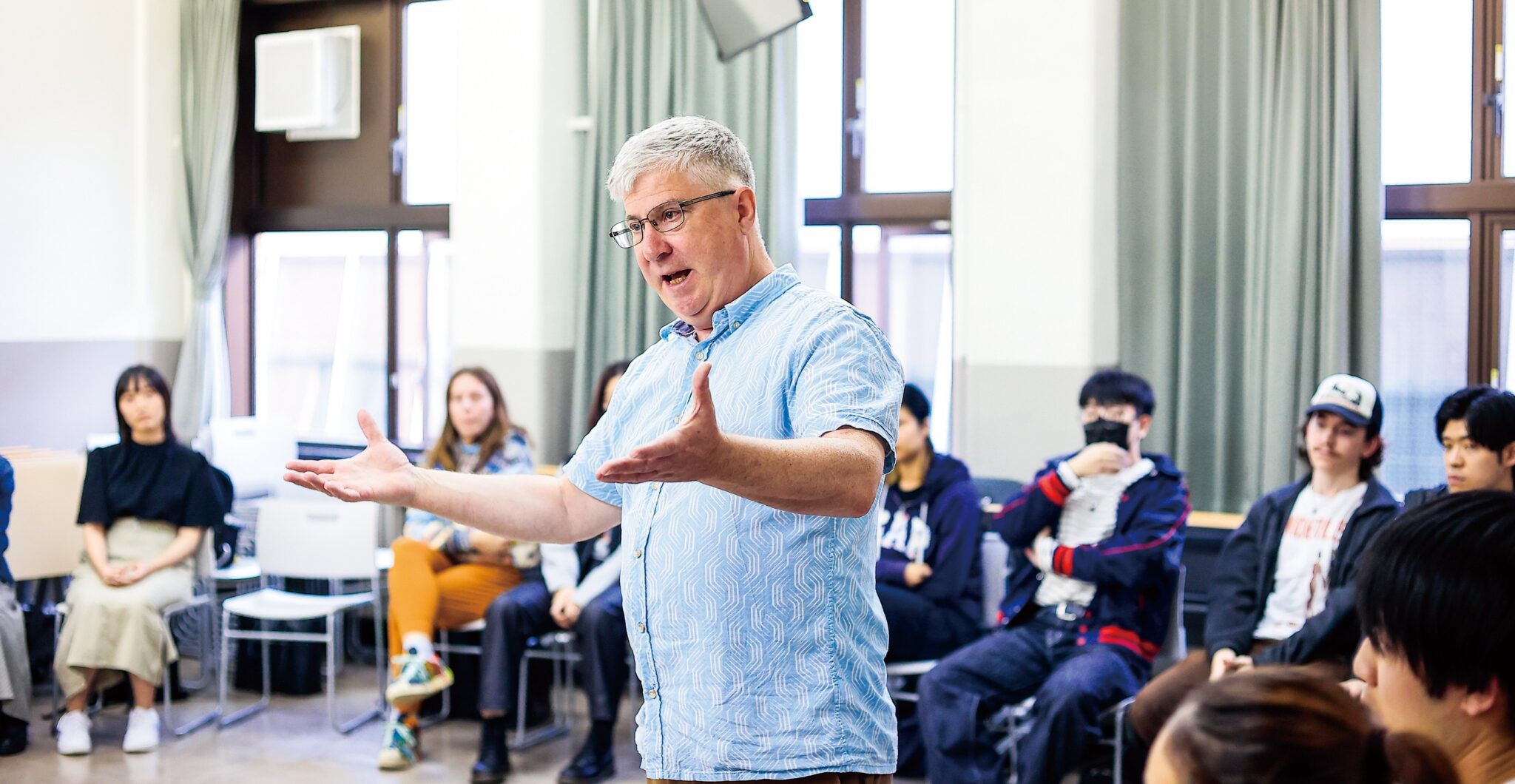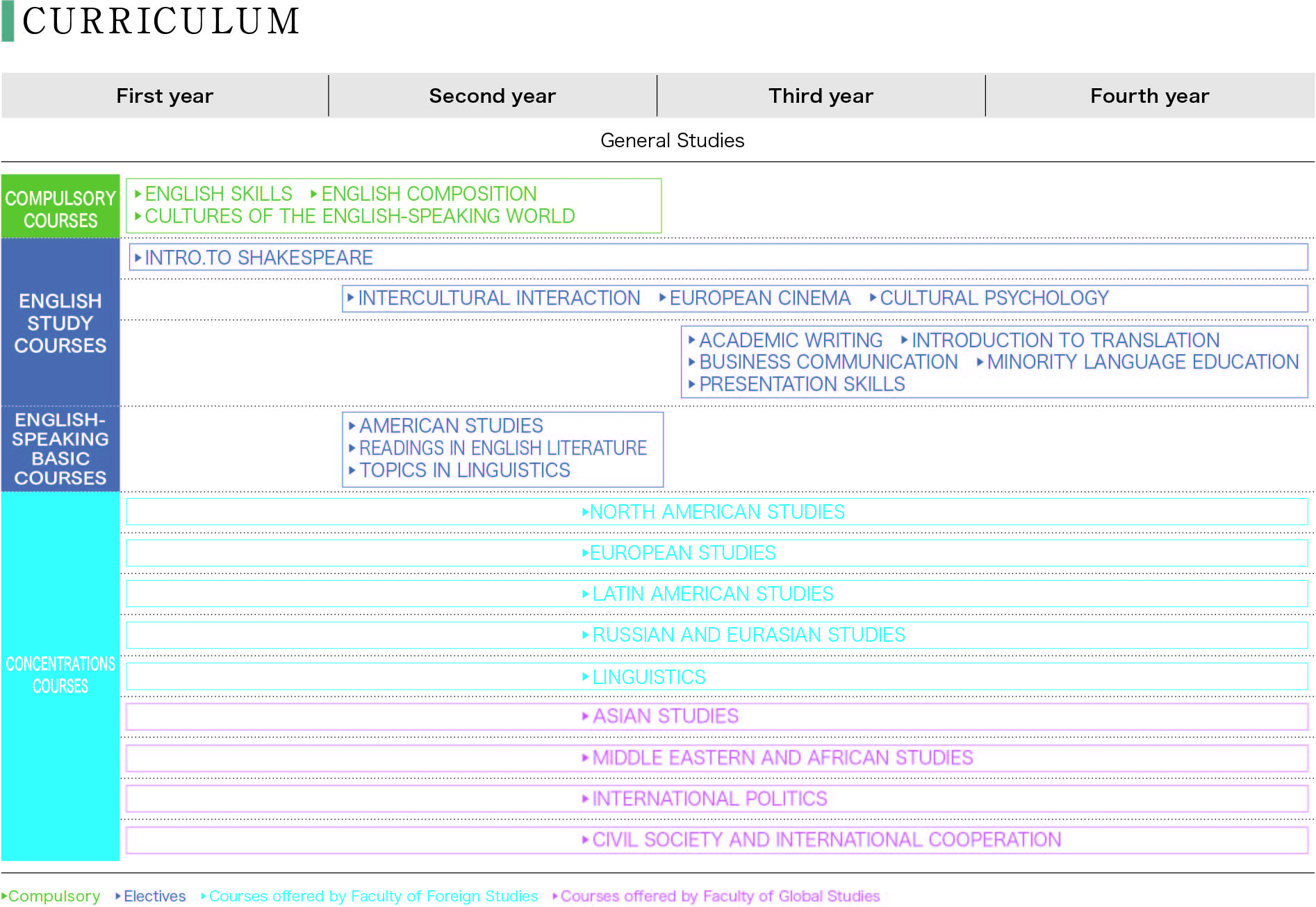Department of English Studies


Department Features
For more than half a century since its founding, the Department of English Studies has had as its educational mission “to provide students with practical English language skills and knowledge of a broad range of cultural backgrounds, and to send them out into society as individuals who can play an active role anywhere in the world.” The world has changed over time, but our mission remains the same. In the midst of rapidly advancing globalization, we are further strengthening the two pillars of our education: outstanding English language skills and a broad-based liberal arts education. In particular, the department offers nine courses of study to cultivate people with not only a broad range of knowledge, but also deeper expertise. Graduates of the department have gone on to diverse fields of study and are active worldwide.
Curriculum
In the First Major program, students take compulsory courses to intensively develop their four English language skills, English and English-Speaking Studies and English-Speaking Basic Courses to learn about the culture and history of English-speaking countries. While improving their English language skills to the point where they can write professional and academic documents in English, students also deepen their understanding of political and social issues in English-speaking countries and consider the impact of differences in regional and people’s backgrounds on communication.
In the Second Major or Minor, students choose one of nine research courses for specialized study and research. Many students gain overseas experience through short-term study-abroad programs or exchange programs, and by utilizing the credit system, it is possible for students to graduate in four years even if they study abroad for one year.
as of 2022
* Please refer to the syllabus for more information on the courses.
Course Examples
- English Skills
Students will improve their four English skills (reading, listening, writing, and speaking) through a variety of class formats, such as debates, using world news, Japanese history, and current events. Each Skills class is designed to prepare students for the more in-depth academic classes offered in the third and fourth years.
- English Composition
Students will acquire the skills to write professional and academic English documents. Students will also learn how to edit, proofread, and cite in order to communicate logically and accurately to others.
- Cultures Eng. Speaking World
Cultures of the English-Speaking World
Students will deepen their issues on the culture and life in English-speaking countries, mainly the U.S. and the U.K., using news, literary works, and movies. Political and social issues will also be touched upon.
- Intercultural Interaction
This course examines the problems that arise when people from different backgrounds communicate, the content and causes of these problems, and how to solve them.
- Cultural Psychology
We will elucidate the differences in cultural backgrounds of individuals and groups. We will approach the question, “How do Japanese and Americans differ psychologically?”
- English and Society
We invite alumni, mainly from the Department of English Studies, to talk about their life paths, their current jobs, and the industry, to help them think about their own career paths.
Available Teaching Licenses and Subjects
- First Category Teaching license for Junior High School (English)
- First Category Teaching license for High School (English)
Curatorial courses are available.
Educational Objectives and Policies
-
To cultivate exceptional proficiency in the English language, and impart a broad base of knowledge (of linguistics, humanities and social sciences, and the basic features of the English-speaking world) that will provide the foundations for specialized research in fields such as area studies and linguistics.
-
To produce individuals capable of contributing to increasingly globalized societies through advanced proficiency in the English language, and experts in research related to area studies and linguistics
-
The Department of English Studies sets standards for the skills and knowledge students should acquire before graduations as described below. Those who fulfill the graduation requirements shall be deemed to have acquired these qualities and will be awarded a diploma. The Department aims to have all students reach a level of proficiency equivalent to “C1” (level sufficient to study at an overseas graduate school) under the Common European Framework of Reference for Languages (CEFR) at the timing of graduation and furthermore to have as many students as possible reach a level equivalent to “C2” (level exceeding C1).
- Abilities related to receptive activities, including “listening” and “reading” English.
- Abilities related to productive activities, including “speaking” and “writing” in English.
- Abilities related to interactive activities, including communicating and negotiating in English.
- Activities related to mediating activities, including interpreting and translating English.
- The ability to understand the history, politics, economy, society and culture of English-speaking areas in the context of their global status and comparisons with Japan.
-
In accordance with the Diploma Policy, the Department of English Studies constructs its curriculum with courses aligned with the following purposes
- 【Major Language – Major Language Courses】These courses provide intensive learning for freshmen and sophomores with an aim to improve their academic English proficiency through various activities and thesis compilation so that students can think, communicate and debate in English using the four language skills. They also seek to have students acquire knowledge of the culture and society of regions where English is spoken as an official language. Classes are delivered with a multidimensional approach, taking various forms, including lectures, group work, and pair work. Many courses are focused on presentations, pursuing ways to effectively understand and communicate rich contents.
- 【Major Language – Basic Area Studies Courses (English-speaking world)】 These courses are offered mainly for sophomores to acquire basic knowledge of the English-speaking world by learning in class on the history, culture, society or language related to the English-speaking world. Classes are delivered with a multidimensional approach, taking various forms, including lectures, group work, and pair work.
- 【Major Language – Area Studies Courses (English-speaking world)】 From their freshman to senior years, students can deepen their knowledge of English and the English-speaking world as well as further improve their English proficiency through courses that students can select in accordance with their interests and concerns.
-
The Department of English Studies:
- Seeks students interested in various issues associated with the language, history, politics, economy, society and culture of English-speaking countries and regions, and motivated to acquire a high level of English proficiency;
- Welcomes students with solid experience in learning English who are equipped with the basic knowledge and skills to study high-level subjects in English and are prepared to be committed to their studies; and,
- Expects students to pursue specialized studies in the discipline or geographical area chosen from the nine Concentrations offered at the Faculty of Foreign Studies, supported by their practical proficiency in English or other foreign languages.
Faculty Members
Noriko ISHII Professor
Yuko OTSUKA Professor
Kimiyo OGAWA Professor
Fumiko SAKASHITA Professor
Takanori TOGO Professor
Laurence WILLIAMS Associate Professor
Marc KAUFMAN Associate Professor
Ayuko TAKEDA Assistant Professor
Mishio YAMANAKA Assistant Professor
Dillon STRUWIG Lecturer
Audrey Sue MORRELL Lecturer
Davey YOUNG Lecturer
